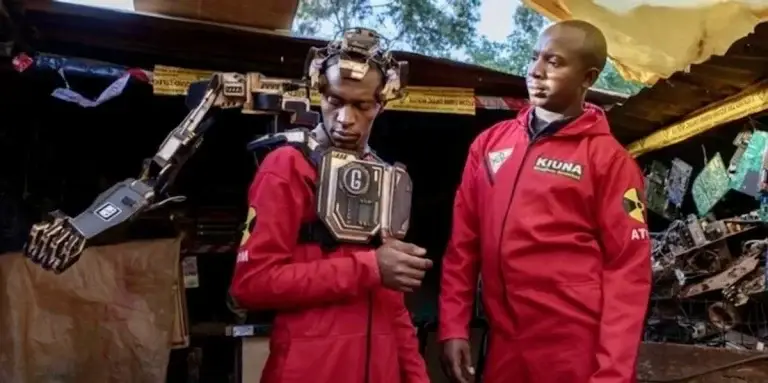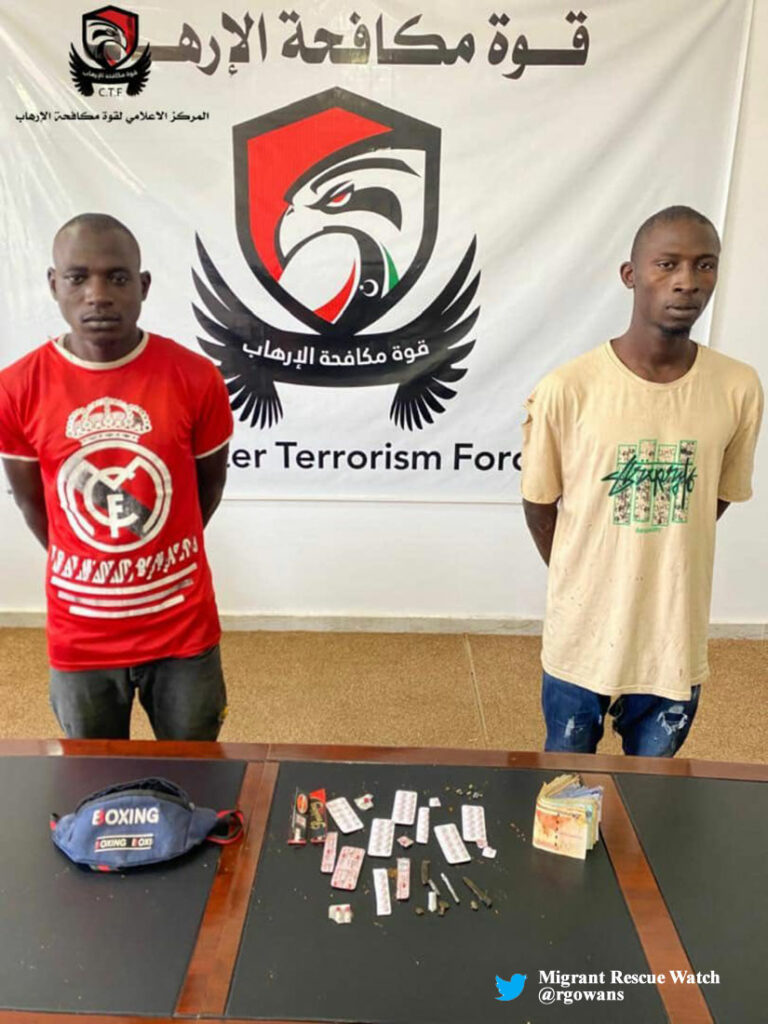Headline
How Two Kenyan School Dropouts Made Prosthetic Arms For People With Disabilities
Published
1 year agoon
By
Editor
Two young Kenyan inventors have invented bio-robotic prosthetic arms from waste materials to help improve the lives of the physically challenged people in 2021.
Both David Gathu and Moses Kiuna were at the age of 29 when they designed a bio-robotic prosthetic arm in helping the people that have lost their limbs.
Recounting their ordeal before venturing into the invention, the duo said they were forced to drop out of college because of the expensive school fees but did not let the challenges steal their vision.
Gathu and Kiuna accomplished their dream to help their communities in a workshop in Kiambu county in Kikuyu, Kenya, north of the capital Nairobi.
READ ALSO: 14-year-old Boy Killed In London Sword Attack
According to Face to Face Africa, the workshop was basically a shed made out of worn-out rusted iron sheets standing next to a chicken coop.
The floor was covered with gravel, making the ground outside the shop and the interior all but indistinguishable, as brown broken glass with tape all around fits the window frame.
Brain signal bio-robotic arm
Another significant thing about the invention was being the world’s first bio-robotic arm operated by brain signals. The invention, which is controlled by brain signals, has been billed as a game-changer in the lives of disabled people in Kenya.
Gathu and Kinyua’s invention was unique and different from most prosthetic technology which is powered by a person’s muscles.
READ ALSO: Woman Reveals Secret To Longevity As She Celebrates 106th Birthday
The arm works by converting brain signals into an electric current by a “NeuroNode” biopotential headset receiver. NeuroNode biopotential was originally invented to help people suffering from paralysis and speech loss.
Also, the inventors narrated that the idea to develop an electronic prosthetic came to them during the pandemic as part of their contribution towards assisting Kenya to battle the pandemic. It was initially created to help COVID-19 sanitisation efforts.
“When the virus hit our country, we decided to create a machine that could help us decontaminate surfaces. It can also be used in schools, restaurants, hospitals,” Shoppe Black quotes Kinyua as saying.
Using waste products
According to a report by Anadolu Agency, the Kenyan inventors solved two problems with their innovations, first, by using waste products to make the environment clean and safe, and helping a community of people living with disabilities.
READ ALSO: Popular Iraqi TikToker Umm Fahad Gunned Down Outside Baghdad Home
“People throw away a lot of things that are harmful to the environment just because they don’t work. If they don’t work, it might be just one component that’s faulty but all the other components still work and can be recycled,” Gathu said.
“We’ve recycled everything that you see here. They throw it away, we pick it up and use it. This has saved us from spending a lot of money because we’re not backed up financially by anyone to come up with our innovations.”
They picked up “junk” that people threw away – things like plastic, rubber, wiring, old computer motherboards, LED lights, USB devices, switches, optical drives, heat sinks, fans, and power supply units – components that they say could be quite expensive to purchase from a shop.
Helping the community
READ ALSO: UK-based Nigerian Doctor Loses Licences Over Sex For Free Botox Injections
Speaking about the physically challenged people, he said, “The main reason we came up with this is to help people in our community who have lost their limbs. We don’t want these people to feel like they can’t do anything, we want them to be dependent on themselves.”
The arm can do many more tasks. They say they are still perfecting their device, but lack of funds has been a challenge.
David Mathenge from the Association for the Physically Disabled of Kenya (APDK), a charity NGO, says: “Such inventions are the future of the science of artificial limbs. This is the science we need to ease the challenges people with disabilities face.”
You may like
Headline
Trump Birthright Citizenship Order Halted In Class-action Suit
Published
1 day agoon
July 10, 2025By
Editor
A federal judge on Thursday halted President Donald Trump’s order restricting birthright citizenship, as opponents of the policy pursue a new legal avenue following the US Supreme Court’s overturning of a previous block.
The high court’s conservative majority delivered a landmark decision in late June that limits the ability of individual judges to issue nationwide injunctions against presidents’ policies.
Several such judges had in fact blocked Trump’s attempt to end the longstanding rule, guaranteed in the US Constitution, that anyone born on US soil is automatically an American citizen.
However, the Supreme Court left open the possibility that orders could be blocked via broad class-action suits against the government.
READ ALSO:‘You Should Get It’, Netanyahu Nominates Trump For Nobel Peace Prize
Trump’s opponents quickly filed new class-action suits seeking to block again the executive order.
On Thursday, Judge Joseph Laplante of the US District of New Hampshire granted class-action status to any child who would potentially be denied citizenship under Trump’s order. The judge ordered a preliminary halt to it as legal proceedings carry on.
The judge delayed his ruling for seven days to permit the Trump administration to appeal.
Cody Wofsy, a lawyer with the American Civil Liberties Union (ACLU) who argued the case, called the ruling a “huge victory” that “will help protect the citizenship of all children born in the United States, as the Constitution intended.”
READ ALSO:Putin Says Will Speak With Trump On Phone Today
Trump’s executive order decrees that children born to parents in the United States illegally or on temporary visas would not automatically become citizens — a radical reinterpretation of the 14th Amendment to the US Constitution.
His administration has argued that the 14th Amendment, passed in the wake of the Civil War, addresses the rights of former slaves and not the children of undocumented migrants or temporary US visitors.
The Supreme Court rejected such a narrow definition in a landmark 1898 case.
READ ALSO:After Fallout With Trump, Elon Musk Says He’s Forming ‘America Party’
The current high court, with a 6-3 conservative majority, avoided ruling last month on the constitutionality of Trump’s executive order and only addressed the issue of nationwide injunctions.
It nonetheless permitted the order to go ahead but delayed its ruling from taking effect until late July to allow for new court challenges.
Several lower courts, in issuing their previous injunctions, had ruled that the executive order violated the Constitution.
Headline
PICTORIAL: Two Undocumented Nigerians Arrested For Drug Trafficking In Libya
Published
1 day agoon
July 10, 2025By
Editor
Libya’s Counter-Terrorism Forces have arrested two undocumented Nigerians over alleged involvement in drug trafficking.
According to a statement shared by Migrant Rescue Watch on X (formerly Twitter) on Thursday, the suspects were caught with quantities of hashish and hallucinogenic pills, including Tramadol and Lyrica.
Authorities also recovered a large sum of cash suspected to be proceeds from drug sales during the operation.
READ ALSO: [JUST IN] AFCON Qualifiers: Super Eagles Stranded At Libya Airport
Following their arrest, the two Nigerians have been handed over to the appropriate legal authorities for further investigation and possible prosecution.

The statement said, “Counter-Terrorism Forces arrested 2 undocumented #migrants of Nigerian nationality for drug trafficking. The individuals were found in possession of hashish, hallucinogenic pills “Tramadol” & “Lyrica” as well as cash from proceeds.
“Both individuals were referred to competent authorities for legal action.”
Headline
31 Workers Escape Death As Tunnel Collapses In Los Angeles
Published
2 days agoon
July 10, 2025By
Editor
All 31 workers escaped without injuries from a collapsed industrial tunnel in Los Angeles’ Wilmington area, after scrambling over a tall pile of loose underground soil, city officials said late on Wednesday.
The trapped workers were shuttled back to the tunnel’s entry point, more than 5 miles (8 km) away from the affected area, after they escaped the collapsed section and met several coworkers in the unaffected part of the tunnel, the Los Angeles Fire Department said in a statement.
The tunnel, which had a diameter of 18 ft (5.5 m), trapped 27 individuals, while four workers entered the damaged section to assist with rescue, LA Fire Chief Ronnie Villanueva told reporters in a media briefing.
READ ALSO: Los Angeles Invaded By Illegal Aliens, Criminals, Says Trump
“The workers had to climb through debris. They had to make themselves out through,” before they were assisted out, Villanueva said.
Robert Ferrante, chief engineer and general manager of Los Angeles County Sanitation Districts, told the briefing that a section of the already built part of the tunnel experienced squeezing ground conditions and partially collapsed.
“LAFD has just reported that all workers who were trapped in the tunnel in Wilmington are now out and accounted for. I just spoke with many of the workers who were trapped. Thank you to all of our brave first responders who acted immediately,” Los Angeles Mayor Karen Bass said in a post on X.
The collapsed section was a part of the Los Angeles County’s Clearwater Project, where the new 7-mile tunnel is being built to upgrade the region’s sewer system, officials added.
(Reuters)
- Congress Newspaper @4: X-Raying The Evolution Of Media In Ijaw Nation
- JUST IN: Psychiatric Hospital Staff Shot Dead In Benin
- Supreme Court: Jubilant Supporters Stunned, Locked Out Of Edo Govt House [PHOTOS]
- Gunmen Invade Catholic Seminary School In Edo, Kill One, Abduct Three
- Pastor Arraigned Over Alleged Rape Of Married Woman In Edo
- OPINION: BAT Rejects Trump’s Amazing Offer
- Nurses Reject NSIWC Circular On Allowances
- LASIEC Releases Validated Candidates’ List Gor Lagos LG Polls
- Lagos Police Deploys 30,000 Officers For LG Polls
- How Law Student’s Inability To Pay N120,000 Caused Her Death At UNIZIK
About Us
Trending

 Metro3 days ago
Metro3 days agoMysterious Bird Found Inside Auchi Poly Lecturer’s Office, Killed

 News4 days ago
News4 days agoBREAKING: FG Officially Releases Age Limit For Admission Into Tertiary Institutions

 News4 days ago
News4 days agoOPINION: APC’s Leprosy Versus ADC’s Scabies

 Politics3 days ago
Politics3 days ago‘The Man I Defeated 32 Years Ago Hasn’t Forgiven Me’ – Ita-Giwa Laments Discrimination Against Women In Politics

 News5 days ago
News5 days agoFlash Flood Warning: Sokoto, Edo, Akwa Ibom, 17 Other States At Risk In July — NiMet

 Politics4 days ago
Politics4 days ago97 Lawyers Line Up To Defend ADC, Mark, Aregbesola Against APC’s ‘Fake Lawsuit’

 Entertainment5 days ago
Entertainment5 days agoOPINION: From The North, ‘A Storm Is Coming’

 News4 days ago
News4 days agoObi In Benin, Donates N15m To St Philomena School of Nursing Sciences

 News2 days ago
News2 days ago‘I Feel Your Pain’ – Ighodalo Reacts To S’Court Verdict On Edo Guber Election

 Politics5 days ago
Politics5 days agoINEC Announces Dates For Commencement Of Continuous Voter Registration In Osun



















